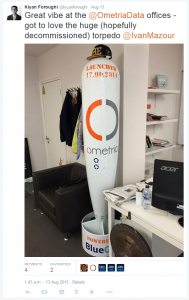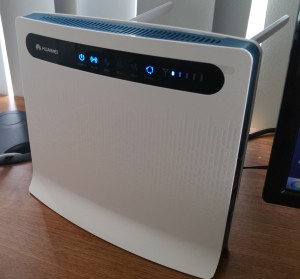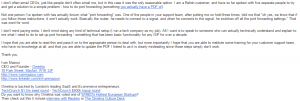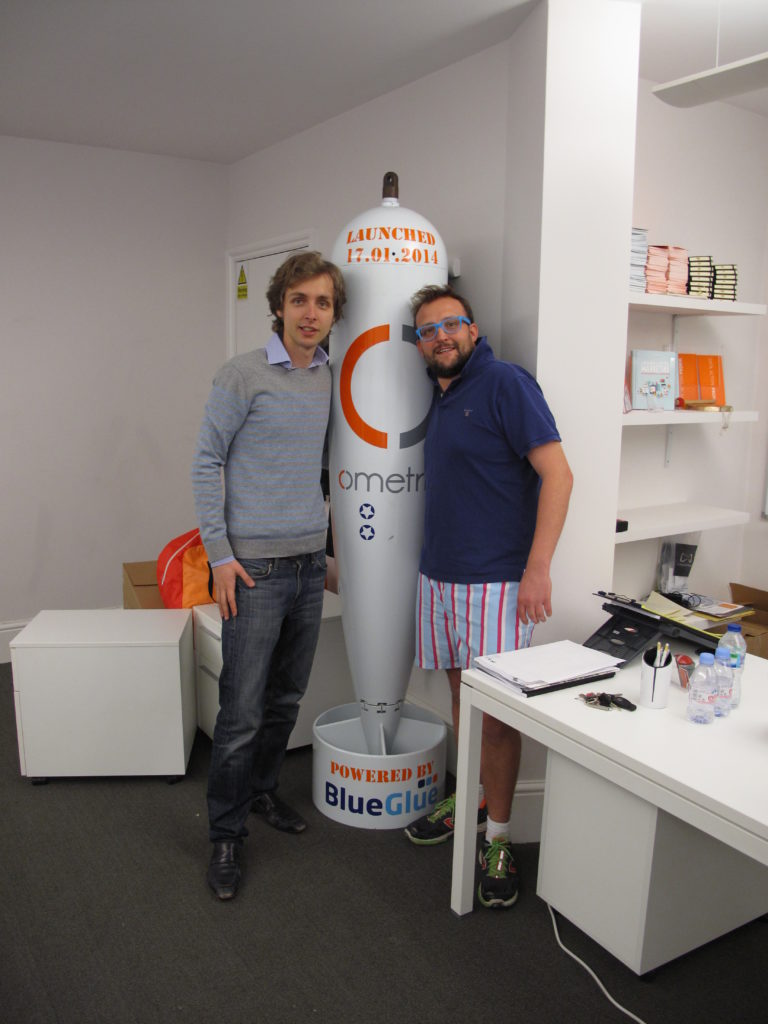A few years ago, in the early days of Ometria, we started using a recruitment company. More than a simple agency, this was a Recruitment Process Outsourcing (RPO) company which had worked with some very well-respected technology companies, and had a model that included a SaaS platform and an approach of genuinely understanding the client’s requirements. I actually wrote about them back in 2013, in a post about how to do a good cold e-mail approach.
We had a great experience with them. They found our marketing manager, who is literally the best possible fit for our company, both in terms of the type of marketing we do, and our company culture, and they found us a great front-end developer who chose to move from a well-funded company in Tel Aviv to come and join us. So based on this great experience, I of course started recommending them to lots of my other friends who were founders or executives, and who were looking to hire. Now you might be thinking that I’m going to start tell you all about how their service started to get worse after that, just like my last post about accountants, but that’s not where we’re going today..
Instead, what happened was that I started getting calls and emails from the people I’d recommended them to, and each of them was complaining. It had turned out that this company had asked them a few questions about their hiring plans, and decided that they weren’t ambitious enough and good enough to work with. The RPO company only wanted to work with extremely fast-growth businesses, looking to hire hundreds of people in the years to come. Hiring for a couple of roles wasn’t worth their trouble, and so they would very bluntly say no. It’s not normal to have a recruiter say no to you, especially if you’re 192.com and a massive established tech company, so understandably my friends were miffed.
I dropped my contact there a line. He was the director of sales, the guy who originally sent that cold email. I sent him an email saying that I had done him a favour by recommending him to a bunch of excellent companies, and by rudely declining working with them, he’d caused tension in my relationships with those people. That same evening, I got a phonecall on my mobile. Now as you most likely know, my phone doesn’t typically ring as I don’t do notifications, but I was sitting in front of my computer at 8pm or so, with the phone out, and saw the call come up on the screen.
It was the CEO of the company. I’d never actually spoken with him before, but he had been told about the issue by the sales director, and decided to take ownership of the problem, and resolve it. He explained the strategy of the company, and how they chose who they worked with, and told me that it was absolutely unacceptable that their way of communicating that to the companies I’d referred was not professional and pleasant. After giving a genuine apology, he told me that he wanted to make it up to us, and asked whether we would be available in the office the following week and whether he could bring a present, one that was rather large in size. Intrigued, I of course accepted.

The Box Arrives
 This torpedo has been a conversation piece for just about every person who has come into the office since then. But more importantly, this story has really stuck in my mind since then. It was one of the most memorable lessons about being a CEO that I’ve had. Because let’s be honest, this was a minor issue. I would have been slightly upset for a day, and forgotten all about it the day after. It wasn’t me that was slighted, it was the people I’d introduced them to, and I could have brushed it off since I was just trying to do everyone a favour. But the CEO saw an opportunity to create a very large amount of goodwill. He saw a negative situation which he could turn to his advantage, and he acted, personally and immediately.
This torpedo has been a conversation piece for just about every person who has come into the office since then. But more importantly, this story has really stuck in my mind since then. It was one of the most memorable lessons about being a CEO that I’ve had. Because let’s be honest, this was a minor issue. I would have been slightly upset for a day, and forgotten all about it the day after. It wasn’t me that was slighted, it was the people I’d introduced them to, and I could have brushed it off since I was just trying to do everyone a favour. But the CEO saw an opportunity to create a very large amount of goodwill. He saw a negative situation which he could turn to his advantage, and he acted, personally and immediately.
Now it’s pretty obvious that there’s a marketing angle to that gift – the RPO company’s logo being on the main conversation piece in our office. But that’s not the real result he was after. By creating such a personal experience, by making us feel as special as his largest clients, and by doing it himself, he knew that I would find myself telling this story to people regularly, and I would find it considerably more difficult to choose to replace them as our recruitment partner. He took an unhappy customer, and he made a grand gesture that turned that unhappy customer into a champion.
A few months ago, I moved across town to a new apartment. Being Russian, I’m used to living in blocks of flats, so once again found myself in a relatively new-build apartment block, and assumed that we would be able to get good internet. I was wrong. 1Mb over ADSL. No joke. So that wasn’t going to happen, and I decided to go for one of the newest ISPs, which provides its connection through a 4G signal. After spending an entire day looking for a corner where it would actually get reception, I finally architected a structure which I could slot the router into to make it work.
 For a decade, I’ve used a network attached storage (NAS) box at home, to backup all my important files and media. All photos, videos and documents end up on there, and get served to any other computer on and off the network. To get to it remotely, I need to do a very basic thing – forward a few ports within my home network. So as soon as I set up the router, I went to try and do that. And it didn’t work. The router had the functionality, but even when it was set up correctly, it just wouldn’t work for some reason.
For a decade, I’ve used a network attached storage (NAS) box at home, to backup all my important files and media. All photos, videos and documents end up on there, and get served to any other computer on and off the network. To get to it remotely, I need to do a very basic thing – forward a few ports within my home network. So as soon as I set up the router, I went to try and do that. And it didn’t work. The router had the functionality, but even when it was set up correctly, it just wouldn’t work for some reason.
I Googled, and found that the ISP had actually released a fact sheet about port forwarding, which described the exact steps I took. So I called support, to ask them what was going on. And then began quite possibly the worst customer support experience of my life. “Port forwarding? I’ve not heard of that. Let me check with my manager. Oh ok, checked with my manager, he doesn’t know what it is either”. Five separate calls, with call-backs, spread over multiple weeks. The most relevant response was, word for word, “ok, it turns out, the router, when he connects, he connects to the network, and he decides to cancel all the settings.” Note that guy was American – it wasn’t a language issue.
It was infuriating. A basic piece of functionality that ISPs had been offering for decades, and for which the company even had an online PDF, was not understood by a single person on their support team. I cracked. Got my wife to tweet their customer support account. A standard response but no solution. So that left me only one choice.
 I emailed the CEO. Guessed his email address and just sent him an email. I told him that I don’t typically email CEOs, but I’d tried everything else and there was nothing left to do. I asked him to do two things – forward my issue to someone who would actually understand the problem, but more importantly institute some training so that the other customers didn’t have to have such awful experiences.
I emailed the CEO. Guessed his email address and just sent him an email. I told him that I don’t typically email CEOs, but I’d tried everything else and there was nothing left to do. I asked him to do two things – forward my issue to someone who would actually understand the problem, but more importantly institute some training so that the other customers didn’t have to have such awful experiences.
A few hours later, I get an email from their head of product, and head of B2B (I’m a B2C customer paying the usual small amount). They knew exactly what they were talking about. Within a few days, I was issued a static IP address, discounted for my troubles, and sent an updated router which would not have the firmware issue that my original router was having. They were aware of the problem, and knew that this combination would resolve it. And sure enough, I’m back to being able to FTP / HTTPS straight into my NAS box. I emailed all three of them this morning to thank them, and am back to being a happy customer of the company.
But there was one clear difference between the two examples. In the first example, the CEO proactively addressed an issue, and created a story that was truly memorable. He went above and beyond, and did more than make us forget the problem. He made us feel special. In the second example, the CEO was happy to forward the email and ensure the resolution, but only achieved the first part of the result. Now no doubt they have thousands of customers, and he certainly doesn’t have time to proactively reach out to each one when there’s a problem, but he definitely didn’t have a process in place that would create champions – not in the way that the first CEO did. And come to think of it, a while ago we had our only ever bad experience with HubSpot, so I emailed Dharmesh Shah, the CTO and Founder, and he replied back saying he’d sort it out. And he’s got twenty thousand customers!
I had a chance to put this lesson into practice recently. One of our customers sent an email which clearly showed that she wasn’t happy. She’s one of the most active users of our platform, and is getting the best ROI out of any customer using us. The amount of customer engagement and revenue that she’s generating with our automated personalised campaigns is on another level. But she wasn’t happy, and that’s all that mattered. So instead of her account manager, or even our Chief Customer Officer, calling her, I jumped on the phone straight away. And we had a great half-hour chat. We talked about any problems she was having, and why she was feeling unhappy. We dug into it and came to the conclusion that while she was getting some great results, she felt that there was much more she could do, but that she didn’t understand the platform enough to make the most of it, and that this was making her feel unhappy since she always wanted to do things in the best possible way. So we put in place a plan to solve this, to provide advanced training for her and her team, and to ensure that she was doing everything that is possible within Ometria. At the end of the call, she thanked me in an almost apologetic way. It was a touching moment – she was grateful I had called personally, and she felt bad, in case I had taken her email the wrong way.
I hadn’t. She is an Ometria customer. She should always be 100% happy. There is absolutely no excuse if she isn’t. If she isn’t happy, it’s not the Customer Success team’s fault. It’s not our Chief Customer Officer’s fault. It’s my fault. I’m the CEO, and it’s up to me to not just solve her problem – it’s up to me to turn her into a champion.

The torpedo, the CEO of BlueGlue, and me
Find out more on the about Ivan Mazour page.
And watch Ivan Mazour's TEDx Talk - "Why we shouldn't be scared of sharing our personal data".

1 comment
What a great lesson. It’s my job to create champions….love it.